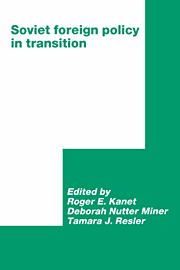Book contents
- Frontmatter
- Contents
- List of tables
- List of contributors
- Preface
- Introduction
- Part I The Soviet Union and the international political system
- Part II The Soviet Union and Europe
- 2 The changing Soviet–East European relationship
- 3 Soviet–Nordic relations in the era of perestroika and new thinking
- 4 Soviet signals to the Nordic countries during the Lithuanian crisis of 1990
- 5 Neutrality and new thinking
- Part III The Soviet Union and the developing world: global trends
- Part IV The Soviet Union and the developing world: regional and country case studies
- Part V Conclusion
- Index
2 - The changing Soviet–East European relationship
Published online by Cambridge University Press: 05 February 2012
- Frontmatter
- Contents
- List of tables
- List of contributors
- Preface
- Introduction
- Part I The Soviet Union and the international political system
- Part II The Soviet Union and Europe
- 2 The changing Soviet–East European relationship
- 3 Soviet–Nordic relations in the era of perestroika and new thinking
- 4 Soviet signals to the Nordic countries during the Lithuanian crisis of 1990
- 5 Neutrality and new thinking
- Part III The Soviet Union and the developing world: global trends
- Part IV The Soviet Union and the developing world: regional and country case studies
- Part V Conclusion
- Index
Summary
One of the most fascinating aspects of the democratic revolutions in Eastern Europe in the latter half of 1989 was Soviet behavior. Not only did the Soviets applaud the overthrow of authoritarian socialist regimes, they actively intervened against them on several occasions and thereby totally reversed the familiar pattern of Soviet intervention in Eastern Europe. The USSR has relinquished the old principle of communist one-party rule. This is a revolutionary development which signifies that hegemony is being replaced by normal interstate relations in the Soviet–East European relationship.
The final step in the radicalization of Soviet policy toward Eastern Europe was taken in August 1989 in connection with the negotiations on the establishment of a Solidarity-led Polish government. Throughout the summer, the Soviet Union was somewhat ambiguous in its pursuit of pan-Europeanism and self-determination in Eastern Europe. Indeed, this ambivalence culminated in a campaign against reformers in Hungary and Poland that lasted until about 12 August. Soviet foreign ministry spokesmen warned against attempts at “destabilization” and criticized the “maneuvers” of Solidarity thereby pressuring Solidarity to offer the Polish Communist Party, the PZPR, the crucial ministries of the interior and defense. Afterwards, the Soviets displayed loyalty toward Solidarity and put pressure on the PZPR instead. On 22 August, a few days after Tadeusz Mazowiecki had been nominated prime minister, Gorbachev devoted a 40-minute phone call urging Rakowski to join the Solidarity-led government.
- Type
- Chapter
- Information
- Soviet Foreign Policy in Transition , pp. 31 - 48Publisher: Cambridge University PressPrint publication year: 1992



